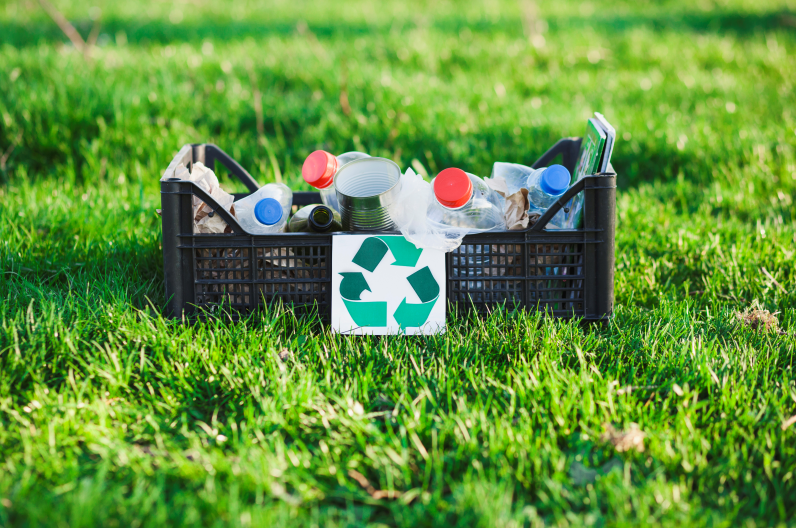
The average American produces over 2,000 pounds of trash each year. It’s easy to ignore just how much we’re wasting, as a society, because we’ve become a disposable-friendly culture. But, waste has become a huge problem all across the globe.
Not only does excess waste cause landfills across the world to fill up, but it contributes to things like climate change. An estimated 1.6 billion tons of carbon dioxide equivalent was generated in 2016 alone from waste. That represented 5% of global CO2 emissions, which contribute to climate change.
Think about the trash you throw away each day. You probably don’t pay much attention to it because there’s always a waste bin nearby. But if you couldn’t throw away your trash and you were forced to carry it, you might start to see just how much waste you produce on a daily basis. Filmmaker Rob Greenfield performed such an experiment, walking around with the average 4.5 pounds of trash Americans produce each day, and he quickly saw how much the little things started to quickly add up.
So how can you reduce your waste footprint? Can you live a waste-free lifestyle? Let’s look at what people are doing on a global scale to reduce waste, and what you can do in your own life to cut back on your trash.
A Trashless Trend
Because waste is becoming such a huge problem throughout the world, there are companies, organizations, and even school programs that have dedicated themselves to educating people and implementing waste-free solutions for a more sustainable future.
On a global scale, major corporations are doing their part to encourage a no-waste trend, including companies like Google. The search giant took the initiative several years ago to start reducing food waste in its cafes. Since then Google has saved over 6 million pounds of food. Amazon has a specific search page for “zero waste products,” and even the film industry has gotten on board to encourage people to reduce their trash impact. Movies like “A Plastic Ocean” and “The True Cost” are some of the best documentaries that truly show the impact of waste in the world.
High schools across the country are even encouraging the next generation to take action for a more sustainable future by implementing recycling programs and working with organizations to cut back on food waste and disposable lunch trays, cutlery, etc.
Fighting waste on a large scale is important, but the biggest impacts start individually. So, what can you really do to cut down on how much trash you produce?
Parting With Plastic
About 300 million tons of plastic are produced each year, and half of it is for single-use purposes like water bottles, bags, and straws. The average American household contributes 185 pounds of plastic waste to that number each year. When you want to live a zero-waste lifestyle, it’s important to keep four “R-words” in mind, especially when it comes to plastic use:
- Reduce
- Reuse
- Recycle
- Rot
Limiting the amount of plastic you use (especially single-use items) can make a huge difference in how much is produced each year and how much ends up in landfills and oceans. Finding ways to reuse or recycle your plastic can also contribute to less production. Rotting or composting isn’t exactly an option for plastic items, but that should be a sign of just how damaging plastic can be to the environment since it doesn’t break down.
In place of using plastic items every day, you can reduce your waste significantly by using replacements like:
- Reusable water bottles
- Canvas grocery bags
- Mason jars
- Reusable Tupperware containers
Buying fewer pre-packaged foods can also make a difference in how much plastic you use on a regular basis. Make smart choices at the grocery store, or go to local farm markets or bulk stores and use your own bags to cut down on packaging.
Everyday Waste Reductions
Once you’ve committed yourself to a zero-waste (or less-waste) lifestyle, it’s important to find little ways each and every day to cut back on your carbon footprint and contribute less to the landfills across the world. Thankfully, there are many things you can do throughout your day and in your own home that can reduce waste and create a more sustainable future.
You can start in your own bathroom by eliminating single-use plastic items and paper for biodegradable alternatives, including toilet paper. Next, take a look at your medicine cabinet. As much as two-thirds of all prescription medications in the U.S. go unused. Medical waste is a serious problem, and you can do your part by only getting prescriptions filled when absolutely necessary, and disposing of them properly and safely. If you really want to reduce plastic waste in the bathroom, you can choose to make your own skincare products, soaps, and shampoos and store them in reusable glass bottles. Not only will it cut down on packaging, but you can control which ingredients you’re using and avoid adding harmful chemicals or preservatives.
Truthfully, you could look at almost every room in your home and make better choices that would cause less waste. Here are a few quick ideas to get started:
- Kitchen: Switch from paper towels to cloth, buy in bulk, and store leftovers in reusable containers.
- Garage: Make a recycling station, install quality insulation, don’t idle your car while waiting for it to warm up.
- Bedroom: Donate wearable clothes to thrift stores, don’t buy new clothes unless necessary, keep handkerchiefs or cloth on hand instead of Kleenex.
- Living room: Use washable rags for dusting, purchase antique or reclaimed furniture instead of new.
When you really take a look at how much trash you create on a regular basis and think about how it would feel to have to bear the weight of it, you might start making more conscious choices about waste. While big changes do need to occur on a global scale, you can do your part at home by reducing your waste footprint with simple, smart, sustainable everyday choices.
You may also like
Sustainable Living 101: Here Are the Changes That Can Make a Huge Difference
Can We Really Put an End to Plastic Waste?
The Importance of Glass Recycling: Stats and Facts You Should Know

